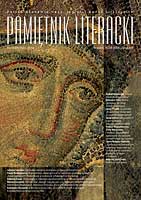XVII-wieczne „dialogi” eurystyczne: „Les Entretiens d’Ariste et d’Eugène” Dominique’a Bouhoursa i „Rozmowy Artaksesa i Ewandra” Stanisława Heraklius
17th Century Euristic “Dialogues”: Dominique Bouhours’ “Les Entretiens d’Ariste et d’Eugène” and Stanisław Herakliusz Lubomirski’s “Dialogues of Art
Author(s): Marina CiccariniSubject(s): Literary Texts
Published by: Instytut Badań Literackich Polskiej Akademii Nauk
Keywords: Bouhours D.; Lubomirski S.H.; "Les Entretiens d’Ariste et d’Eugène"; “Dialogues of Artakses and Ewander"; entretiens; dialogues
Summary/Abstract: Translated from the Italian by Monika Woźniak. Entretiens, vastly popular in 17th century in France, are “erudite, but devoid of pedantry” dialogues derived from Platonian tradition, and having syncretic contents and light form. They mirror a dire need for changes awaken by a new spirituality of the epoch: the religious and the secular ethics that, both in courts and in Jesuit Colleges, was expressed as a discourse combining good speech and a good behaviour. This necessity of revival concerns also Poland: Les Entretiens d’Ariste et d’Eugène by Dominique Bouhours, one of the well-known dialogues of this kind in Europe, became the formal model for Stanisław Herakliusz Lubomirski’s Dialogues of Artakses and Ewander – a text referring to tradition, and in many ways innovative. The search for the new political and ethical balance characteristic of the entire Central-Western Europe in 17th century was originally expressed in Lubomirski’s work and simultaneously referred to the particular situation in Poland. It was effected, among others, by the recourse to a new literary medium: dialogue-monologue in a light tone and rhetorical language, apparently devoid of purpose, rich in erudite quotations and allusions, and revealing a deep emotional engagement.
Journal: Pamiętnik Literacki. Czasopismo kwartalne poświęcone historii i krytyce literatury polskiej
- Issue Year: 2005
- Issue No: 2
- Page Range: 143-154
- Page Count: 12
- Language: Polish

